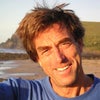ASTORIA: John Jacob Astor and Thomas Jefferson’s Lost Pacific Empire
Five years after Lewis and Clark completed their famous mission, another more audacious expedition sets out for the Pacific. In this exclusive excerpt from the new book 'Astoria,' the legendary Overland Party attempts to establish America's first commercial colony on the wild and unclaimed Northwest coast—provided, of course, they survive the journey.
New perk: Easily find new routes and hidden gems, upcoming running events, and more near you. Your weekly Local Running Newsletter has everything you need to lace up! .
It was glorious to be on the water, at first. The little river wound smoothly through a broad, high mountain valley dotted with grassy meadows and groves of old cottonwood trees. The voyageurs paddled rhythmically to chansons sung out by the fifteen steersmen who swung the big canoes agilely around the river’s tight bends and along its willow banks, heading generally southwest. Autumn-yellow leaves fluttered down and settled on the gentle swirls of current. A few miles to their left, or eastward, rose the great barrier of the Tetons they had just crossed in this October of 1811, the gray rock spires of its upper- most peaks veined with white from the first hints of winter’s snowfall.
“[T]he mountain,” reported the party’s leader, Wilson Price Hunt, “we believed was our last.”
Only five years had passed since Lewis and Clark had returned from their epic journey to the Pacific. The fifteen-canoe flotilla was one of two advance parties, one overland and one by sea, sent from New York by John Jacob Astor, with the enthusiastic support of Thomas Jefferson, to establish America’s first colony on the wild and unclaimed Northwest Coast—the Pacific equivalent of the Jamestown or Plymouth colonies. For Astor, a youngish German immigrant to America who had grown wealthy in the fur trade, the colony at the mouth of the Columbia would serve as the epicenter of a global commercial empire that leveraged nearly all the wealth of western North America into one vast trade network that passed through his own hands. For Thomas Jefferson it would provide the beginnings of a separate country on the West Coast—a sister democracy to the United States that looked out to the Pacific.
While the Sea-Going Party rounded Cape Horn en route to the West Coast and Columbia’s mouth, the Overland Party, led by young New Jersey businessman Wilson Price Hunt, had followed the route up the Missouri that Lewis and Clark had blazed a few years before. But the farther Hunt’s party traveled upriver, the worse the stories they heard about the ferocity of the Blackfeet Indians. Finally, Hunt, a neophyte in the wilderness who was universally referred to as a nice person, decided to avoid a head-on conflict with the Blackfeet and explore a possibly easier route to the Pacific. He would veer away from the Missouri, skirt south around the Blackfeet, and strike across an enormous stretch of uncharted terrain in hopes of finding a headwaters branch of the Columbia.
[quote]The new colony at the mouth of the Columbia would provide the beginnings of a separate country on the West Coast—a sister democracy to the United States that looked out to the Pacific.[/quote]
Hunt’s large party of sixty—French Canadian voyageurs, Scottish fur traders, American hunters, a Native American interpreter with his pregnant wife and their two toddlers—had left the Missouri in July. They spent four months trekking on foot and with horses purchased from the Plains Indians, the great caravan carrying tons of trade goods and supplies to start Astor’s West Coast empire. After traversing today’s Dakotas and Wyoming, crossing the Bighorn Mountains, the Wind River Range, and the Tetons, they had arrived at this small river. Here they built their fifteen large canoes from cottonwood trees, abandoned their hundred and fifteen horses, and, leaving a few trappers behind, shoved off into the unknown.
No European had paddled this river. No European knew where it ran. It was a guess, as if they had taken up a random piece in a vast geographic puzzle that measured a thousand or more miles across and now tried to click that piece into its proper place. Likely from Indian information and its westward flow, the partners to whom Astor had given shares in the great Pacific enterprise, Hunt and Crooks, Mackenzie and McClellan, believed this small river eventually joined a branch of the Columbia and would lead them to the “great salt lake”—the Pacific Ocean.
Despite the gentle current and beautiful scenery, the weather was brisk that first day. Flocks of ducks and geese bobbed in the riverbank eddies, driven down from the north by the first wave of cold. The paddlers pointed out to one another encouraging signs of beaver in the form of gnawed trees and stick-built lodges. Periodic snow flurries swept across the little river in white veils, casting the flotilla in shades of gray, with the voyageurs in their capotes, or hooded cloaks, like a procession of singing monks gliding down the smooth water. They were happy. These “Men of the North” well knew this weather and this paddling. Winter was coming. But they believed they had crossed the final range of the Rockies. The Pacific felt near.
They paddled the small river’s twisting course nearly thirty miles that first day. The smaller river then joined a larger flow. This was the watercourse they called the Mad River, which they had encountered on the far side of the Tetons some days earlier. But here it was smoother—another encouraging sign.
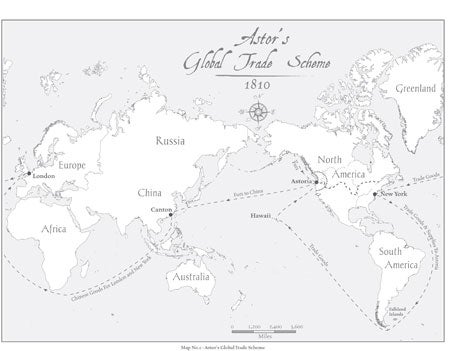
Hunt noted that it could easily float a canoe of any size—good information to have when establishing Mr. Astor’s network of fur posts in these unknown regions. The Mad River—or the Canoe River, as Hunt dubbed it, putting the best possible spin on its name—danced along in a clear, beautiful green. The river left the mountains and cut through the broad lava plain, straightening and gaining speed, as if to whisk them, and future loads of Mr. Astor’s furs, straight to the Pacific, thence across to China, to complete the great, golden triangle trade. Circling the globe, his ships would carry trade goods from New York to his “emporium” at the mouth of the Columbia, exchange them for lustrous sea otter and other furs with the Coastal Indians, transport them to Canton, sell them at immense profit, and bring teas, silks, and other luxury Chinese goods back to London and New York.
On the second day, they had paddled nearly forty miles on the unknown river when, late in the day, they heard rapids. Two canoes swamped. Although they saved the men, they lost one canoe and all its trade goods. Astor, however, had hired the best in the business in a canoe—the French Canadian voyageurs. They were not daunted. On the third day they had to portage a low waterfall, where the river ran in a kind of crack in the lava plain. They made only made six miles, and likewise only six on the fourth. But then their pace picked up on the swift but mostly smooth river, making a good 70 miles on the fifth day, and again on the seventh day.
On the ninth day, October 28, 1811, however, the routine changed. The river channel tightened. On each bank, lava walls rose sharply in gray-black columns of basalt, clumps of minty sagebrush and tufts of tawny autumn grasses sprouting from cliff ledges. The current swiftened, the green water bunching up against the black walls and shoreline boulders. The lead canoe picked its way, bowman scanning for the best route, steersman prying his steering paddle to swing the stern around, calling out to the voyageurs the strokes he needed, while the other canoes followed.
They whisked through several rapids without mishap. They approached the entrance to a canyon, the lead canoe didn’t stop. The second canoe followed, carrying partner Ramsay Crooks in the bow and voyageur Clappine in the stern with three voyageurs to paddle. Weaving down a swift channel between rocks, scouting ahead from the bow, Crooks spotted a midstream rock in their path. He called out a warning to Clappine, but the steersman didn’t hear him, or Clappine didn’t have time to pry the steering paddle, or call out to the other voyageurs and swing the heavy cottonwood canoe.
With a hollow thunk it slammed head-on into the basalt boulder. Like the cleaving blow of a giant axe, the impact instantly split the fragile hull along its length. Frigid, swirling water engulfed the hull and it rolled easily, spilling out its load of food and gear and voyageurs.
Crooks and one voyageur, both strong swimmers, struck for the safety of the riverbank. Stroking hard across rushing tongues of current, they managed to drag themselves to the rocky shore. The other two voyageurs and the steersman Clappine had far less confidence as swimmers. The threesome clung to the hull of the swamped canoe as it washed downstream like a half-sunken log, with Clappine clinging to its stern.
Clunk!
It slammed its bow end into another boulder. The two voyageurs clinging to the hull released their grip from the canoe and seized the big rock, scrambling onto it.
But Clappine, either from fright or lack of confidence in his ability to swim to the rock, held tight to the canoe’s upstream end, its stern, his customary spot as a steersman. The current shoved against the hull and swung the canoe broadside. The canoe spun off the rock, propelling Clappine out into the middle of the powerful current.
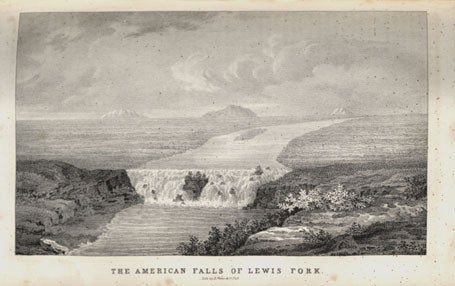
His horrified companions watched the turbulent river sweep Clappine and the swamped hull toward the canyon’s mouth. The lone head and the swamped canoe bobbed along helplessly. Then they tumbled over the lip of cascading rapids and disappeared from sight.
It was the emotional impact of losing Clappine that struck them first. A friend of all, a steersman with years of experience, he had a fine, powerful singing voice—a prerequisite for taking the stern of a voyageur’s canoe. It would have been Clappine who started the rounds of singing, Clappine who prompted the voyageurs’ response, Clappine who kept spirits high and kept them paddling and pushing onward.
��
At the clear running fountain sauntering by one day, I found it so compelling I bathed without delay/ (Chorus from paddlers): Your love long since overcame me/ Ever in my heart you’ll stay
But they would hear his powerful voice no more. The canoes—now only thirteen of them—beached on the rocky shore. The voyageurs and partners and hunters combed the riverbanks up and down. There was no sign of Clappine, or of the split canoe or the trade goods it carried.
It was the Overland Party’s first death. It stunned the group— “struck a chill into every bosom,” as Washington Irving, who was commissioned by Astor decades later to write the Astoria story, phrased it.
The loss of Clappine now only underscored the deepening predicament of the entire party. At the main encampment, beside a thundering thirty-foot drop, Hunt and the partners conferred. The Scottish partners dubbed it “Caldron Linn,” after a famous waterfall in the Scottish Highlands. Just below it was a narrow gorge. Hunt led a small scouting party along the canyon’s north rim and found the river choked with one cascade after another, which they called the “Devil’s Scuttle Hole.” Another scouting party on the south rim discovered a notch in the gorge’s steep side about six miles downstream beyond what looked like the worst of the rapids. This had possibilities. They laid out a plan.
“Sixteen men, with four of our best canoes, went to attempt the passage,” wrote Hunt.
Six miles was not an unusual distance for the voyageurs to portage. They easily carried canoes and baggage on their powerful shoulders over sagebrush plains and lava rock and negotiated the steep descent to the river. Here, they tried to “line” or lower the canoes through the rapids with ropes. Almost immediately they lost one canoe and all its trade goods. The other three canoes wedged fast ��among exposed rocks, pinned by the thousands of pounds of pressure exerted by the current. Even the strong-armed voyageurs, were unable to budge them. Abandoning the three canoes, they trekked, disheartened, back to the main camp at Caldron Linn.
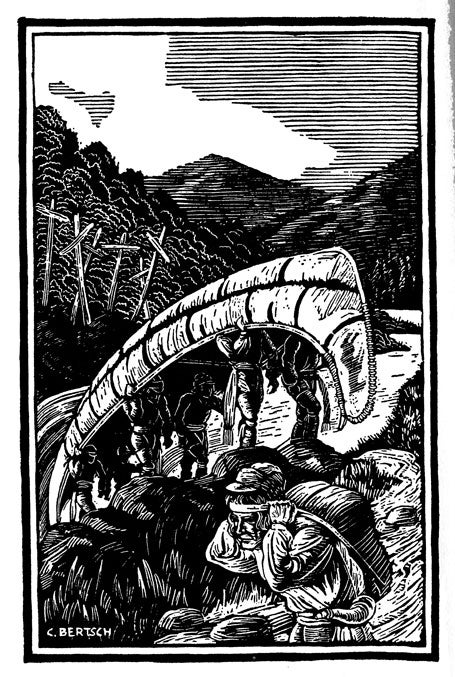
“We saw no way to continue our journey by water,” reported Hunt.
The Overland Party was now stuck. They couldn’t go forward by canoe. They’d left their horses what they estimated was 340 miles upstream. They had no idea where this river might run, only that it eventually reached the Pacific. But their most immediate problem was this: food. Specifically, food to feed a party of fifty.
“Our situation became critical,” reported Hunt. “We had enough food for about five days.”
Hunt now had to make his second big decision. As the situation grew dire, Hunt, consulting with the Scottish partners, mapped a new strategy. As he noted tersely in his journal on November 1, “we changed our plans.”
In essence, several small reconnaissance parties led by different partners would split off from the main group and fan out looking for an avenue of escape or a source of food. One reconnaissance party, led by Ramsay Crooks, would head on foot back upstream to try to recover the horses, while others would go forward on foot. If a reconnaissance party couldn’t find an easy way out and if it couldn’t report back to the main group, these small parties would simply keep going until reaching safety of the Columbia’s mouth, where the Sea-Going Party presumably had already arrived by ship to lay the colony’s foundation.
Hunt’s main group, numbering thirty-four, paddled back upriver a short distance from Caldron Linn, scouting for an obvious escape or some source of food. They set nets but caught only a single fish. The hunters brought in only a few beaver, whose meat Hunt ordered dried. A few days after leaving, Crooks and his small party returned to the main group, also empty-handed. It was already early November. They realized they had no chance of traveling far enough upstream to retrieve the horses before winter descended. Meanwhile, a messenger from a downstream reconnaissance party returned, reporting that, as far as they could see, the river persisted tumultuously through a gorge.
[quote]“I bought two dogs,” he recorded with satisfaction at one stop, “and we ate one for breakfast.”[/quote]
It was growing colder by the day. Their food supply was dwindling. Delayed by his own logistics, his lack of urgency months earlier, and the fruitless sojourn he had made upstream, Hunt thrashed around for an escape from their predicament. The frustration erupted even in his own minimal journal, when he reported that, on November 7, his main party returned downstream to Caldron Linn
“We had wasted nine days in futile explorations.”
They decided to split up even further, as smaller parties had a better chance of obtaining enough food. Leaving Caldron Linn, the two parties of twenty, plus the family of Pierre Dorion, the interpreter. started down opposite riverbanks on the morning of November 9, 1811, Hunt on the north rim of the gorge, Crooks on the south rim. Each member of Hunt’s party carried a ration of five and a quarter pounds of dried jerky. Cliffs, rapids, and massive chunks of shoreline basalt made it virtually impossible to walk along the riverbank itself. Unencumbered by two small children, Crooks’s party quickly pulled ahead on the south rim and was soon lost from sight. Neither party had any idea where they were headed, or any notion of how many days that meager ration of food would need to last.
The buffalo jerky was soon gone. At times the Hunt party’s rations were reduced to nothing but bouillon. They passed an occasional small Shoshone encampment along the river, its dwellings of reeds and grasses piled like haystacks.
“The women fled in such haste,” wrote Hunt, “that they did not have time to take their children who could not walk, but simply covered them with straw. The poor little creatures were terrified when I lifted the straw to look at them. Even the men trembled, as though I were some ferocious animal.”
Most Shoshone camps had little food to spare from the meager supplies they had gathered for the oncoming winter, but some willingly traded small amounts with Hunt.��
“I bought two dogs,” he recorded with satisfaction at one stop, “and we ate one for breakfast.”
While taking a shortcut across a tributary valley, they came to a few prosperous-looking Shoshone villages. They traded for what they could, and kept going along the Mad River, presumably toward the Columbia and the Pacific Ocean.
But then the Mad River suddenly left the lava plain. The terrain around it buckled. The river twisted its way into barren foothills, then steep mountains that squeezed the river, forcing Hunt’s party to clamber up the slopes above its cliffy banks.
December 4 strained them to the utmost. Dragging themselves up steep mountainsides above the river’s cliffs, they laboriously broke a trail through new-fallen snow up to their knees. Winds blew across the snowy slopes, broken here and there by pine groves. The temperature plummeted. There were twenty of them, almost everyone on foot, with the Dorion toddlers carried on a horse or pregnant Marie Dorion’s back. One can picture Hunt’s party trudging along, heads down in a hunched file, breathing hard, occasionally looking up—the cold skies scouring the mountaintops, the steep fields of endless white skirting down. As daylight dims, the cold sharpens. The whiteness deepens to shades of purples and grays. They need to sleep. A profound chill takes hold inside one’s core the moment one stops climbing and the sweat from panting uphill exertion begins to freeze.
“We were nearly exhausted by the harshness of the weather,” recorded Hunt, “when we had the good luck of reaching a patch of pine trees at sunset.”
The grove offered shelter from frigid winds and deep snow. They heaped up a bonfire from dead pine boughs and pressed around it, gratefully warming themselves and ripping into the last of their roasted horse meat.
“Although we had struggled ahead all day,” wrote Hunt, “we were, because of the twisting course of the river, only four miles from our camp of the day before.”
The next day a whiteout blizzard caught them on the mountainside. Guided only by the sound of the rapids rushing somewhere in the whiteness far below, they slipped and skittered on their moccasins down the precipitous snowy slopes. One of the horses suddenly slipped, tumbling down for several hundred feet. Amazingly, it wasn’t hurt. That night, camped in slushy snow along the Mad River’s banks, Hunt ordered one of their last two horses slaughtered—no longer squeamish, as he had been just ten days earlier, about eating the meat of animals he had befriended.
The following day brought a deeply unpleasant surprise.
“On the 6th,” reported Hunt, “to my astonishment and distress I saw Mr. Crooks and his people on the other side of the river.”
So hungry and exhausted they could barely stay upright, Crooks and his party of nineteen were struggling along the opposite riverbank the wrong way—upstream. As soon as they saw Hunt’s party they yelled at the top of their voices for food. Hunt quickly ordered his men to construct a bullboat, using the hide of a slaughtered horse wrapped around a bowl-shaped wooden frame. He sent across one of the voyageurs, Sardepie, to deliver fresh horse meat to the starving men and brought back the group’s leader, Ramsay Crooks, and another voyageur, Le Clerc. As the bullboat neared the bank with the passengers, Hunt and company were startled to see how wasted and dejected his counterpart leader and partner had become since they parted a month earlier.
Crooks ate ravenously. Then he talked. He and his group had traveled down the left-hand bank of the river. The land was especially arid and barren. For the first eighteen days, Crooks reported, they ate only half a meal each day; then for three days they ate a beaver they’d killed, wild cherries, and old moccasin soles. For the last six days all twenty of them had been living off the flesh and entrails of a single dog that had accompanied them.
From where he met Hunt, Crooks and his party had already traveled three days farther down the Mad River. Progress had proved excruciatingly difficult. Cliffs dropped straight into the water, he reported. The river roared through a narrow gorge in an almost continuous stretch of rapids. They had tried to skirt above the cliffs that dropped to the water. The only way past was to climb a mountain that rose steeply from the river. For half a day Crooks and his men trudged upward through snow. They reached a knob that offered a view. They saw they had not yet climbed even halfway up the mountain that flanked the riverbank. From the heights, they had hoped to see the broad Columbia River plain lying ahead, leading gently to the Pacific. Instead they spotted snowy mountain after snowy mountain stretching as far as they could see. Far, far below them, the river ran through a monstrous unknown gorge. Today we call it Hell’s Canyon of the Snake River—the deepest canyon in North America.
Wilson Hunt Price, Ramsay Crooks and their parties were now trapped in it, without food, as winter came on.
After tossing restlessly through the night of December 6, Hunt now had to choose among several bleak options: go farther downstream into the mile-and-a-half-deep mountain gorge; abandon the river and attempt to climb westward over steep, snowy mountains toward the Pacific; or retreat upriver to the broad lava plain where they’d encountered the more prosperous Shoshone camps in fertile valleys, and hope the Shoshone hadn’t moved in the meantime.
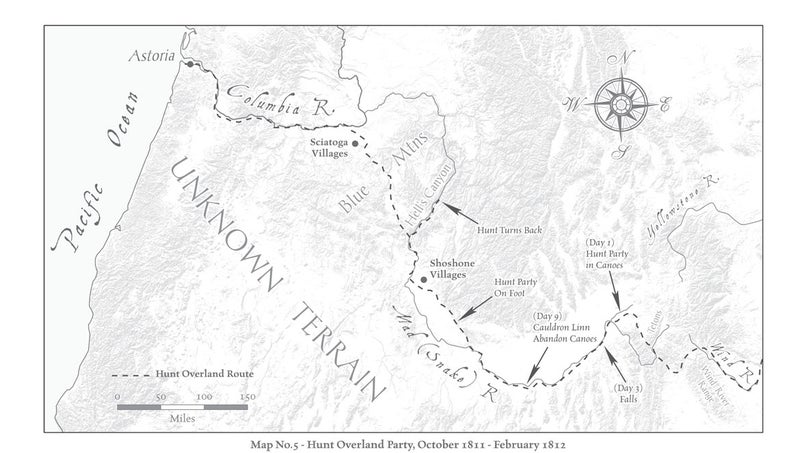
Hunt’s carefully cultivated unity now unraveled under the pressure of profound hunger. Finally, only Hunt and five men remained with the failing Crooks and Le Clerc, the rest having pushed ahead in ones and twos and threes. Crooks’ starving party, without Crooks’, struggled upstream on the opposite bank. Hunt and the stragglers camped together that night of December 8. During the night, Crooks fell very ill. Only three beaver skins remained for food. The sheer instinctive necessity of survival was stripping away whatever authority Hunt possessed. Yet he felt weighted by a deep sense of personal responsibility. What had started out as a series of business decisions for this “very respectable gentleman from Trenton, New Jersey,” had now evolved into naked choices over life and death. Reading between the spare lines of his journal, one can hear his tortured thoughts.
Where was he needed more? By the side of a good but failing man along the trail? Or with his party leading them and negotiating for food when—and if—they reached the Shoshone camp? Loyalty to a partner? Or loyalty to the success of the mission? How could he abandon one of Mr. Astor’s primary partners to die of starvation in a river gorge a thousand miles or more from the nearest white settlement?
Hunt finally chose again: He would go ahead. But he didn’t abandon his weaker men entirely—not yet. He left two of the three beaver skins for them to eat, and two men to help Crooks and Le Clerc along the trail.
For ten days they retraced their steps upriver, hoping to find the prosperous tipi village of the Shoshone Indians in the fertile tributary valley. After pausing with Crooks and Le Clerc, Hunt hurried to catch up with his group. He found that some of them hadn’t eaten a single thing in four days of hard, cold trekking over boulders and skirting cliffs.
Then they had a stroke of luck, spotting a new collection of Shoshone tipis along the riverbank, surrounded by a herd of twenty horses. The band apparently had emerged from a tributary mountain valley since Hunt and company had passed the spot downriver. Fearing the Shoshone would flee or hide their horses at the bizarre sight of white men, Hunt approached gingerly and managed to buy (Hunt’s account) or grab (Irving’s account), or some combination thereof, five of the horses before the Shoshone and horses could scatter. He ordered one horse slaughtered on the spot, and meat delivered on the back of another horse downriver to the ailing Crooks and Le Clerc. The starving group devoured the remainder.
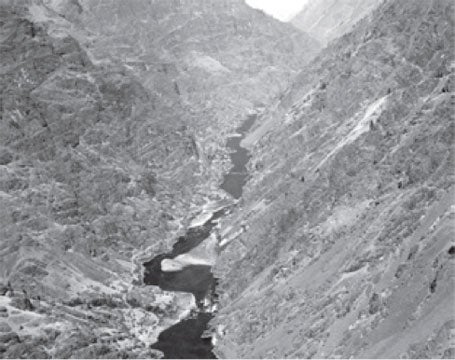
Slightly fortified, Crooks and Le Clerc managed to catch up briefly with the Hunt group. Crooks’s men, however, were still on the opposite riverbank. “[H]overing like spectres of famine,” as Irving, who inter- viewed eyewitnesses to the incident, put it. Crooks ordered a bullboat constructed immediately and sent a supply of horse meat across the river to his men. Everyone in the starving party received the meat eagerly, but one of the voyageurs in the Crooks group, Jean Baptiste Prevost, had become frantic with hunger. He demanded to be ferried across the river immediately to the Hunt group, saying death was certain on his side. Prevost forced his way aboard the returning bullboat. As it approached the shore where Hunt’s party roasted hunks of horse meat over fires, Prevost leapt up in the bullboat, clapped his hands in delight, and according to Irving’s account, which possibly came from Crooks himself, capsized the fragile craft. The boat’s steersman, Pierre Delaunay, barely saved himself. Prevost did not.
“The poor wretch,” wrote Irving, “was swept away by the current and drowned. . . .”
It was the Overland Party’s second death.
For the next four days, the two parties continued to struggle upriver on opposite banks. It snowed. The temperature plummeted. Hissing rafts of ice congealed on the surface of the Mad River. Exhausted, hungry, chilled, they finally stumbled out of the mountain gorge and onto the broad lava plain on December 16. They camped that night at a tributary stream they had forded on November 26.
“Thus for twenty days,” lamented Hunt in his journal, “we had worn ourselves out futilely trying to find a passage along the lower part of this river.”
They had reached the Shoshone villages, which offered them some temporary safety.�� Hunt asked the Shoshone many times, communicating with difficulty through Dorion, who was part Sioux, and various language barriers, how to get to the Columbia, or “Big River,” as it was known to Native Americans.
They told him that it was seventeen to twenty-one nights along the trail to reach a village of the Sciatoga tribe near the Big River. By now Hunt had learned that without a Shoshone guide he probably would never reach the Sciatoga village. White explorers in North America both before and after him would learn the same basic lesson.��
“I offered a gun, some pistols, a horse, etc., to whoever would serve me as a guide.”
No one accepted the post.
“They all replied that we would freeze to death and pleaded with me to remain with them during the winter.”
Hunt grew desperate. He combed the Shoshone camp searching for a willing guide.
“I went to every tepee along the river banks, but without success. I could not get along without one, for that meant running the risk that we would all die. But to remain in this place would be still worse, after having come so far and at such great cost.”
Yet for all his strengths and failings, Hunt remained an astute reader of human character. Though he’d always been well mannered and unfailingly polite—“a gentleman of the mildest disposition” was how Bradbury, the botanist, had described him—Hunt now deliberately and forcefully changed his diplomatic tone. In order to hire a guide, rather than appealing to their desire for possessions, he played to their sense of pride.��
“I ended by telling the Indians that they spoke with forked tongues, that they were lying to me. I accused them of being women; in short, I challenged them with whatever expressions would goad them most.”
And it worked.
“At last,” he wrote, “one of them found courage enough to volunteer to be our guide as far as the village of the Sciatogas.”
From the book by Peter Stark, to be published in March 2014 by Ecco. Copyright © 2014 by Peter Stark.


